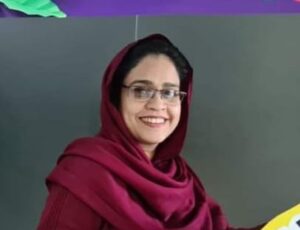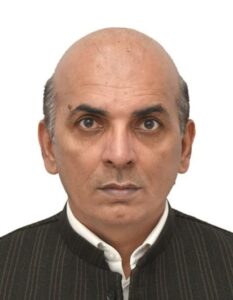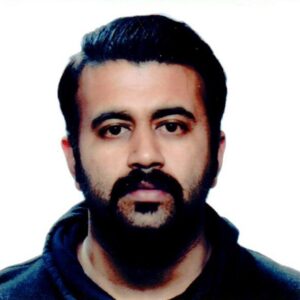Rafia Tehseen (chairperson)

A born communicator; Rafia is M.A in English (language, literature and TEFL) with distinction from Quaid-e-Azam University (1999); and to firmly position herself in educational corridors she earned a B.Ed. from A.I.O.U in the same year. Her professional career spans over more than two decades including rich experiences in Pakistan and Bangladesh.
She had a flying start at PAF College of Education, Chaklala, Rawalpindi; where she taught the teachers to be, that helped her understand the importance of being interactive and comprehendible. Due to her utmost professionalism and repute she was offered a teaching position at NUST Institute of IT and then the Air University; where she put herself on an upward trajectory.
Rafia has always been an arch believer in diversity of skills and it was this very belief that made her a broadcaster for the external services of Pakistan Broadcasting Corporation. Due to the clarity of expression, she went on to direct and narrate countless plays and poetries at various forums.
Ms. Tahseen served as a lecturer English and Business studies Departments of two leading and prestigious Universities of Bangladesh, namely North South University, and Independent University, for seven years. Apart from conventional teaching responsibilities, she served as a lead trainer in conducting various training courses and workshops on Effective Communication, Skill Retention, Stress Management, and Motivation, Language Skills, and Presentation Skills for students as well as professionals in Pakistan and Bangladesh. Rafia also served as a certified Cambridge Examiner for the British Council in Dhaka.
During her stay in Bangladesh, Rafia also worked as the Co-trainer for cross cultural communication and capacity building training in a leading local NGO Ain-o-Selish-Kendra (ASK); lawyers of Dr. Kamal Hossain & Associates; and for the engineers of Southtech Pvt. Ltd, in Dhaka. She participated in a series of Steiner education workshops and contributed towards the debate regarding incorporating the model in the context of Bangladeshi education system.
In January 2013, Rafia joined MYMA Communications (Pvt.) Ltd, as the Business Unit Head. She dealt with research, training and content development. Alongside, as an associate of Institute of Policy Studies Islamabad, she conducted trainings on life skills, interpersonal skills, career navigation, and women in leadership.
Currently, she is serving as a Senior Language Teacher at SSC & HSSC levels at APSAC, DHAI- II, Islamabad, Where she strives to mentor the youth beyond the textbook realm.
MUkhtar ahmed ali (VICE CHAIRPERSON)

Mukhtar Ahmad Ali accomplished M. Phil degree in Development Studies (with distinction) from the Institute of Development Studies (IDS), University of Sussex, UK with over 18 years of diverse work experience in Pakistan in areas like governance, budget analysis, right to information, elections, local governments, capacity building, legislative oversight/ drafting, consumer protection, policy development/ advice, education, youth development, democratic development, decentralization and police reforms.
Mr. Mukhtar also worked as an Information Commissioner at the Punjab Information Commission, which is a special institution established by the Government of the Punjab under the Punjab Transparency and Right to Information Act 2013 to facilitate and enforce citizens’ right to information. His glimpses from work include working Team Leader/ Senior Technical Advisor on the Consolidating Democracy in Pakistan (CDIP) Project, which was funded by the British Government. He is also currently leading the Centre for Peace and Development Initiatives (CPDI) as Executive Director.
He oversaw the implementation of a large number of projects in numerous areas including local governance, water and sanitation, legislative development, energy and voters’ education. He has also honored with the positions of Board member of Pakistan Coalition for Education (PCE) as well as the Trust for Democratic Education Accountability (TDEA), which established the Free and Fair Election Network (FAFEN) to observe elections in Pakistan and has experience of observing elections in Pakistan, as well as a in other countries as a member of observation missions of the Commonwealth Observers Group and the Asian Network for Free Elections (ANFRAL).
For several years, Mr. Mukhtar served as a member of the Advisory Committee of the Federal Tax Ombudsman. He also played an important role in the civil society efforts for right to information, right to education, whistle-blowers’ protection and electoral reform legislation in Pakistan, especially in terms of research, promoting public debate and engagement with relevant parliamentary committees. He served as a member of several committees setup by the Government of the Punjab or legislative bodies, which drafted the bills on right to free and compulsory education, right to information and whistle-blowers’ protection. He has worked on numerous committees constituted by the Election Commission of Pakistan for, among others, Committee to Design and Carry Out Post-Election Review, Legal Framework Committee and Strategic Planning Core Committee. Furthermore, he is visiting faculty member of, among others, the National Institute of Management (NIM), Lahore; NIM, Quetta; National Management College (NMC), Lahore; and Federal Election Academy (FEA), where he has been delivering lectures on right to information, foreign policy of Pakistan, Origins and Evolution of Democracy, and political system of Pakistan.
Mr. Mukhtar also served as a member of the team that carried out “International Assessment of Agricultural Knowledge, Science and Technology (IAAKST)” in 2005-06.
adnan anjum saeed akhtar (finance secretary)

With a post-graduate degree in Development Studies from the prestigious Institute of Development Studies (IDS) at the University of Sussex, United Kingdom (UK), in the past few years, Adnan Anjum Saeed Akhter focused exclusively on the fields of human rights, democracy, and governance in Pakistan.
His experience includes overseeing the Program Development and Strategic Communication team at Trust for Democratic Education and Accountability (TDEA), served as the Director of Programs for the largest governance and voice and accountability project in Pakistan (USAID’s Citizens’ Voice Project), multiple grant distribution cycles focusing on enhancing women’s participation and inclusion, election observation and reforms, parliamentary strengthening, and governance oversight nationwide, leading the observation program for the General Elections 2018 at TDEA-FAFEN, managing the coordinated work of more than 30 organizations and 20,000 citizen observers. This observation generated statistically grounded findings that enabled the development of evidence-based recommendations for electoral reforms, some of which were completely or partially reflected in the post-election review by the Election Commission of Pakistan (ECP). Mr. Adnan also oversaw the specialized and unique observation carried out by persons with disabilities (PWDs), transgender persons, and women, which also led to tangible reforms. These marginalized groups documented their electoral experiences from gender and inclusion lenses.
He also oversaw the establishment of Pakistan’s first independent citizens’ observation of legislatures. He played a pivotal role in developing a unique methodology for citizens’ observation of legislatures and standing committees, which was appraised by a joint study by the World Bank and National Democratic Institute (NDI). Moreover, he led a team that developed the first-of-its-kind parliamentary information portal (www.openparliament.pk), which enabled citizens to engage with their representatives and hold them accountable directly. He also developed a robust methodology for appraising individual parliamentarians’ performance (members’ scorecards), which has been widely used by civil society as well as political parties.
Mr. Adnan’s work experience in Pakistan is complemented by foreign assignments of observing the electoral environment, processes and procedures. Very recently, he was part of the Asian Network for Free Election’s (ANFREL) advance assessment team to evaluate the pre-election environment, campaign and preparations in Myanmar. The report provided crucial recommendations to the Union’s Election Commission (UEC) as well as local civil society for reforming the electoral system. His past experience in coordinating with international, national, and local partners, governments and donor organizations has prepared me well to be relied upon for creative solutions to complex governance challenges, critical thinking, quality outputs and results, socially sensitive and culturally compatible communication, and constructive workplace interactions.
